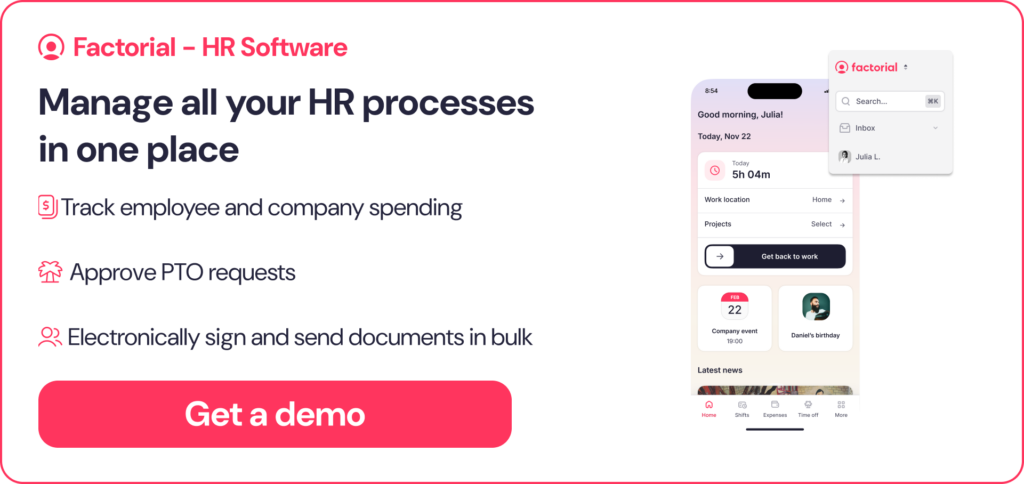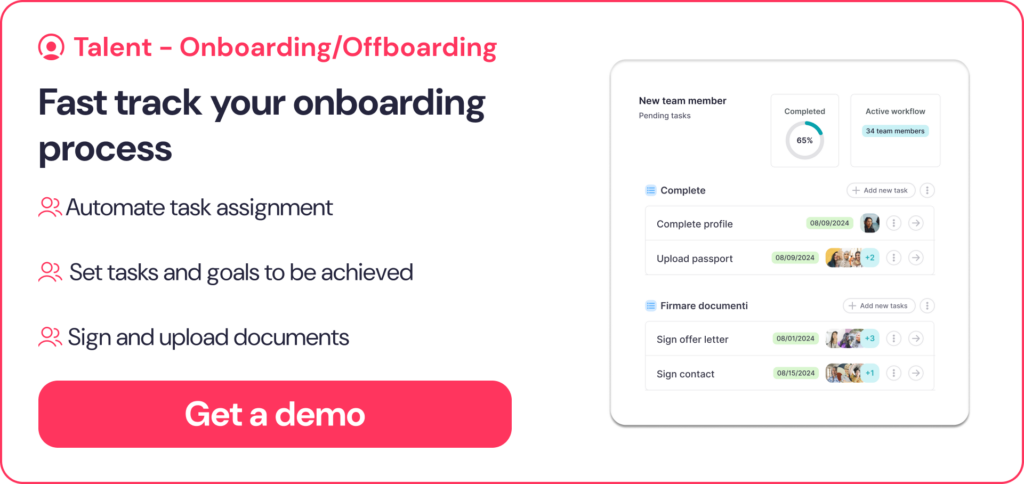Since the introduction of The Equality Act 2010, businesses have had a duty to rethink disability at work. The legislation requires employers to remove workplace barriers for people with disabilities. It also mandates making reasonable adjustments whenever possible.
This article will provide a detailed explanation of the Equality Act. Additionally, it also outlines all the steps to take make necessary reasonable adjustments for your disabled employees.
- What is The Equality Act?
- What are Reasonable Adjustments?
- Reasonable Adjustments: Examples
- Do You Have to Make Reasonable Adjustments?
- How Long Does an Employer Have to Make Reasonable Adjustments?
- What Happens if You Don’t Comply
- How to Avoid Complaints
- ✅ Try Factorial Free for 14 Days
What is The Equality Act?
According to the UK Government, “the Equality Act 2010 protects people from discrimination in the workplace and in wider society.” More specifically, this act protects against discrimination from occurring in “employment, education, access to goods, services and facilities, and buying and renting land or property”.
The Equality Act 2010 came into force on 1st October 2010, and applies to any unlawful treatment, discrimination or victimisation that occurs after that date.
In the past, lawmakers introduced various anti-discrimination laws that did not sufficiently protect workers. The Equality Act replaced all of these laws with a single Act, making the rules easier to understand and giving people more protection.
Regarding employment, employers must support disabled employees to the best of their abilities by making reasonable adjustments.
What are Reasonable Adjustments?
Reasonable adjustments are specific provisions relating to disability at work are included within The Equality Act. Here, the concept of ‘discrimination arising from disability’ is spotlighted, alongside thresholds for the duty to make reasonable adjustments for disabled people in the workplace.
In other words, organizations and service providers must accommodate disabled people if their disability puts them at a disadvantage compared to those who are not disabled. This includes both physical disabilities and mental health conditions.
Different employers interpret the word “reasonable” in different ways. However, employers should consider carefully if adjustments will remove disadvantages by liaising with the people involved and avoiding assumptions.
Ideally, the adjustment would be practical to make and also affordable as it is the responsibility of the employer to fund these changes. The cost of an adjustment can be taken into account when deciding if it is reasonable or not. There is a government scheme called Access To Work which can help with come costs for employees or interviewees if those costs are not reasonable for you as an employee to pay.
Reasonable Adjustments: Examples
Managing a disability at work might mean making reasonable adjustments tailored to the employee in question. This can involve a range of actions, such as making physical changes to the workplace or providing the necessary equipment and support. The goal is to ensure that the individual can perform their job effectively without facing unnecessary barriers. Examples of reasonable adjustments in the workplace include:
- Changing the lighting above someone’s desk
- Providing an accessible parking space
- Installing audio-visual fire alarms for a deaf employee
- Buying a specialist keyboard or mouse for someone with arthritis
- Enabling employees to work part-time or flexible hours.
Employers can also make reasonable adjustments by adapting ways of working and rethinking how things are done around the workplace. This could include:
- Distributing work differently within the team
- Giving interviewees more time to take tests (within an interview setting)
- Finding new ways of training people
- Giving different responsibilities or a new/adapted role that is more suited to them.
These examples of reasonable adjustments are not exhaustive. Bear in mind that they might look very different for you and your staff. It’s important to remember that they are unique to an individual and there isn’t one blanket solution for everyone.
Do You Have to Make Reasonable Adjustments?
Ultimately, it depends on the nature of their job as reasonable adjustments are often a case by case situation. Put simply, reasonable adjustments may not be required in cases where they alter the fundamental nature of a job. For example, in a coffee shop, an employee who cannot make coffee may not be accommodated if no alternative role is available.
However, employers should make every effort to make adjustments for disability at work, but you do not have to make adjustments that are unreasonable. There is a subjective element to the word ‘reasonable’, but it’s advisable to be generous with your interpretation to improve employee wellbeing and avoid absenteeism.
How Long Does an Employer Have to Make Reasonable Adjustments?
There is no official timeline to make reasonable adjustments for disability at work, however there are some legal precedents on this subject that you should be familiar with.
A ruling from the Court of Appeal in 2011 highlighted that reasonable adjustments must be made as soon as an employer is able to take steps to avoid any relevant disadvantage to its employee. This makes it more difficult to give an exact timeframe for reasonable adjustments. As soon as you become aware of the required adjustment, you should take immediate action to implement it. Waiting to make the adjustment could result in non-compliance or further disadvantage to the affected individual.
There is also an expectation that employers should make adjustments as soon as possible after an employee asks them for one, whether that be directly or indirectly. For example, an employee might not say directly that they require a specific adjustment. For example, if an employee complains about a specific feature of the building, such as ramps, or a lack of equipment, it signals that the employer is aware a reasonable adjustment is needed. This would be perceived as the employer’s responsibility to address the issue.
What Happens if You Don’t Comply?
If you fail to comply with your duty to make reasonable adjustments for disability at work, you are discriminating against disabled employees and are leaving yourself vulnerable to a claim. This also applies to people applying and interviewing for jobs.
It might be the case that you feel the adjustment required was not reasonable. In this case you should:
- Make an effort to talk with the employee involved and explain your decision.
- Try to find another way to support them by making other adjustments that are reasonable.
If one of your employees feels like they’ve been discriminated against for a disability at work, their first attempt at solving it should be to make an informal complaint to their line manager (or potential hiring manager if they are a job applicant).
On the other hand, if the problem can’t be resolved informally, then it is likely they will make a claim at an employment tribunal.
If a tribunal finds that you failed to make reasonable adjustments, you can be liable for an unlimited amount of damages. There is no cap on the amount a tribunal can award if they determine you have discriminated against an employee or job applicant. This makes the potential financial consequences significant and you risk harming your business.
How To Avoid Complaints
The best way to avoid complaints is to simply always be on the lookout for ways in which you can assist and enable those suffering with a disability. This starts with your recruitment process and should always be at the front of your mind throughout an employee’s time with you.
Employees returning to work after a prolonged absence related to ill-health present another opportunity to manage disability at work. Consider conducting a return to work interview to understand any new needs they might have and how you can make relevant alterations.
One area in particular to be sensitive and aware of is if someone is suffering from long-term physical or mental health problems. If problems are allowed to persist for a long time and reasonable adjustments are put off, the likelihood of a successful claim is going to increase drastically.
It’s also important to remember that every individual experiences disability and illness differently. This means it’s crucial that you don’t make generalisations about a particular issue. For example, if one person is content without a ramp at the entrance, it doesn’t necessarily mean another person would feel the same way.
Listening to your employees and having an open and honest dialogue with them is the best way to understand their issues and requirements. Together you can agree on the best course of action and make a written plan together.
When it comes to disability at work, detailing everything in writing is integral. Having requests and responses recorded is the best way to defend yourself against any spurious claims should they ever arise.
Get Started with Factorial
Factorial’s all-in-one software transforms clunky, manual processes into streamlined and efficient ones. This allows your HR team to focus more on their team and less on administrative tasks.
By replacing excel spreadsheets and endless paperwork with a digital solution, you will remove the common roadblocks that HR come up against. Your HR team will be equipped with the tools they need to enact and enable rather than hinder and block.
Our HR software collates all of the processes related to time management, talent management, legal and finance in one place. This frees up valuable time that HR teams which allows them to focus on making strategic decisions and improving company efficiency.
✅ Try Factorial free for 14 days and discover HR software that will transform your business.





